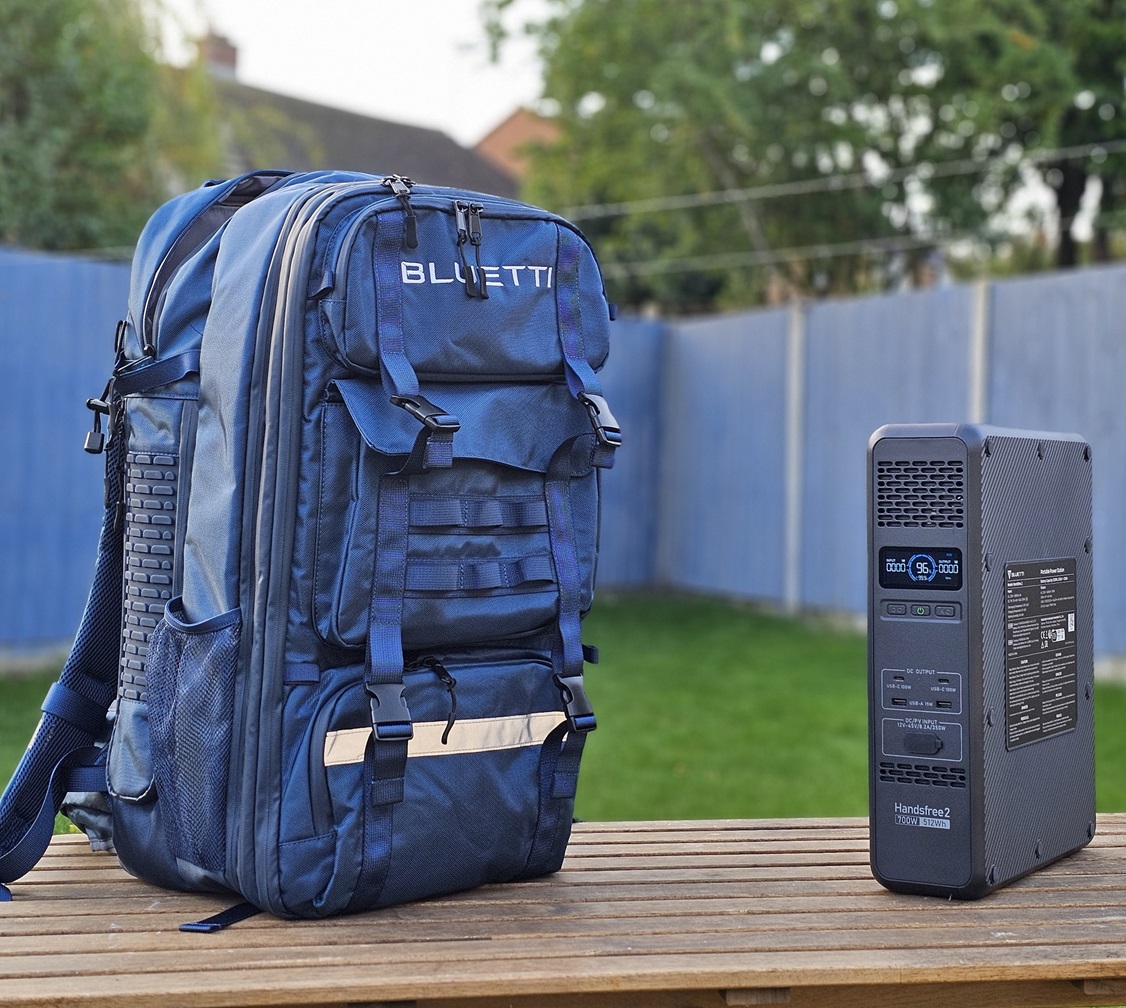
Having reviewed several portable power stations from varying brands across the years, the noted mainstays of the industry was mainly copy and paste with few tweaks and features. Nearly all of them were of a large boxlike design often with a status screen, varying power in and outputs and maybe an app. Portable was only the word used in that you could pick it up and cart it off elsewhere, but some of them were bulky and pushing north of 20kgs in weight.
The Bluetti Handsfree 2 brings a whole new designed approach with portable the forefront of the product aimed at a niche of customers who may find this the very thing they are after. With a power bank shaped differently (narrower, flatter body shape) compared to the standard box. How does it compare to the best portable power stations? I put it to the test.
Bluetti Handsfree 2: Packaging
We received the Bluetti Handsfree 2 which is a Bluetti branded dark blue rucksack like bag, in it containing the power bank with 512Wh of power storage and a maximum combined output of 700W.
The box was a plain cardboard box which we have come to expect from Bluetti with only text on the outside detailing what’s within.
Pulling the bag out we found everything to be contained within the bag including the following:
- The aforementioned bag
- The Bluetti Handsfree 2 700W 512Wh power bank
- AC charging cable
- An XT60 to MC4 cable
- Manual and Warranty Card
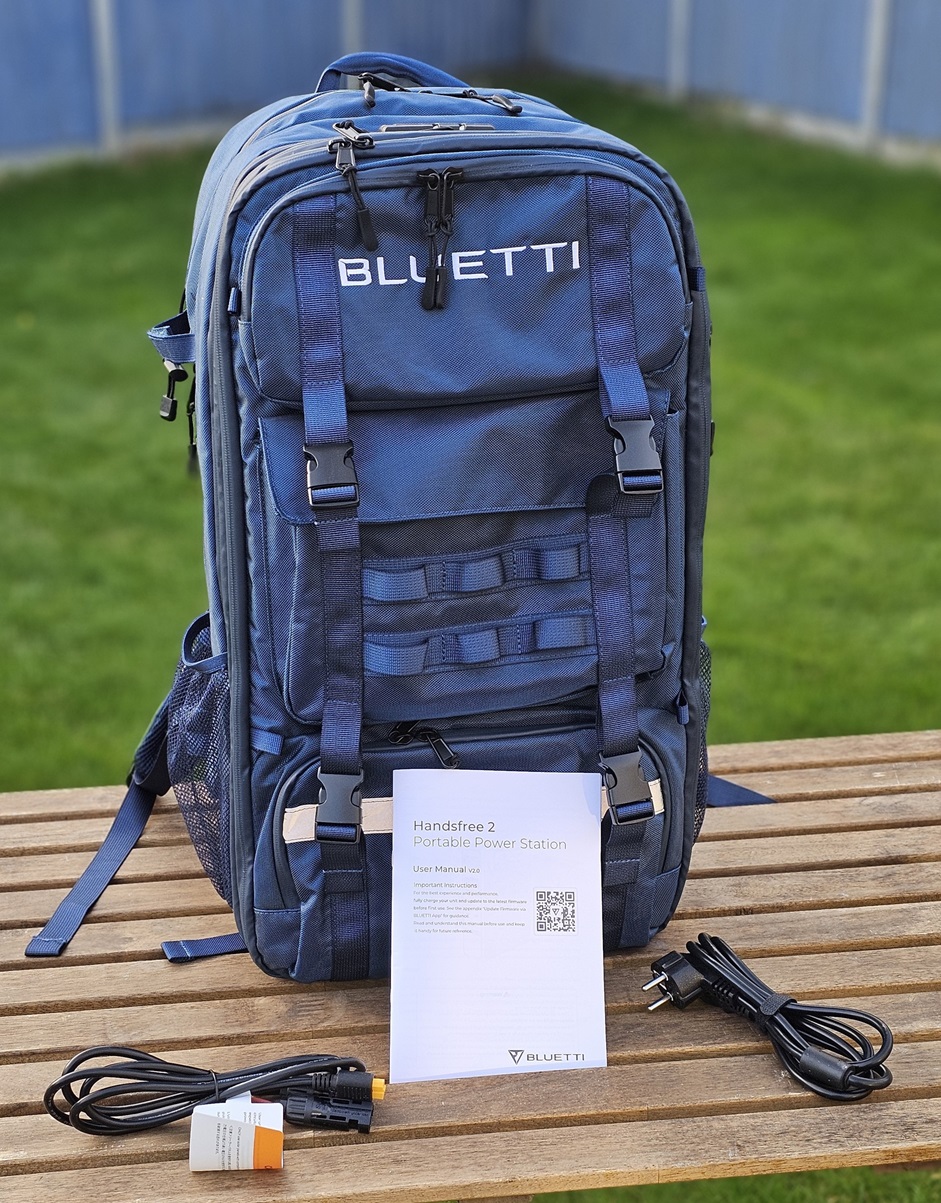
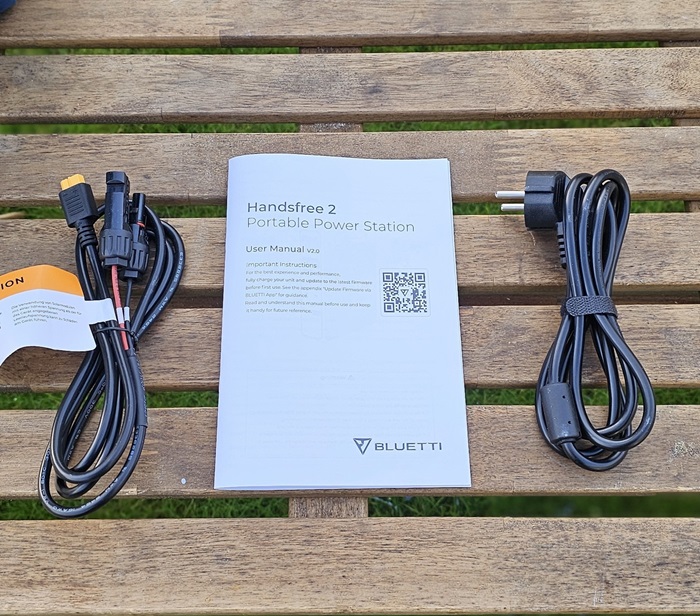
Bluetti Handsfree 2: Fit and feel
Firstly, we will have a look at the power bank, measuring 382mm high by 300mm deep by 99mm wide you can tell is not box shape, think more like the “under monitor PC case” often seen in business office shape.
When talking of the power bank we will be discussing it in its upright position as the lettering clearly indicates that this is the right way up for the unit. At the base of the unit are two large rubber feet on the bottom to prevent sliding or tipping. The sides of body have the now recognisable Bluetti ridge effect on the sides we have seen I the previously reviewed AC240 and AC200L. One of the sides is clearly considered the down side if the unit was to be laid flat as there are 10 rubber feet.
At the front is the status screen, more on this later, below the screen are the only buttons, they are the on/off buttons for the unit itself, DC and AC. Below that are two USB-C, both capable of 100W outputs, below that are two USB-A with 15W output. Lastly at the front is the XT60 DC input for the unit supporting between 12 to 45Volts with a max 8.2amp or 350W input to charge the power bank.
At the rear is the AC output outputting 230V with a maximum 700W, the inverter capable of Pure Sine Wave output at 50 or 60Hz, in the centre is the AC input, thankfully a standard C13 connector and lastly the earthing screw point for the unit.
It was noted that our review unit was originally built for the EU market as it came with the Schuko Type F AC cable and AC outlet built into the unit meaning that for us to use and review it, we had to use an EU to UK plug travel adapter. Of note, this power bank does have UPS capability.
The status screen is the typical layout expected in Bluetti products, if you have used their other power banks before, you’ll be familiar with this one. In the centre is the total % remaining with a rough running time below depending on in/outputs. On the left is the input wattage for both AC and DC, on the right is the output wattage for AC or DC with indication as to which one is being used.
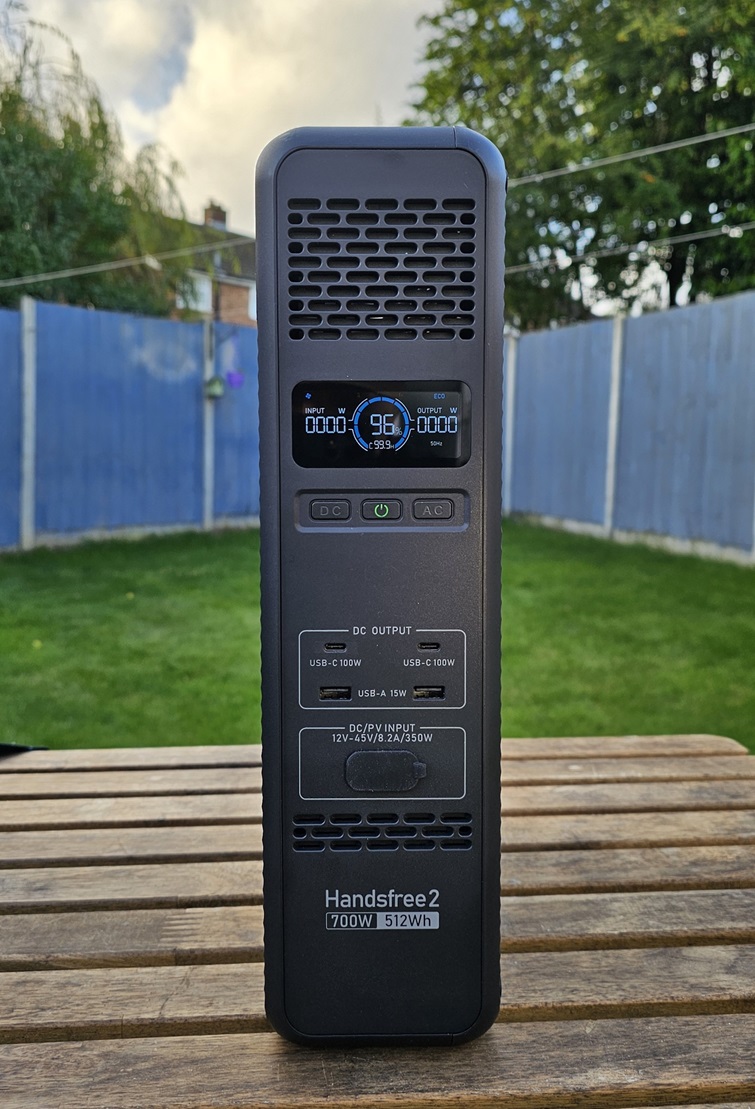
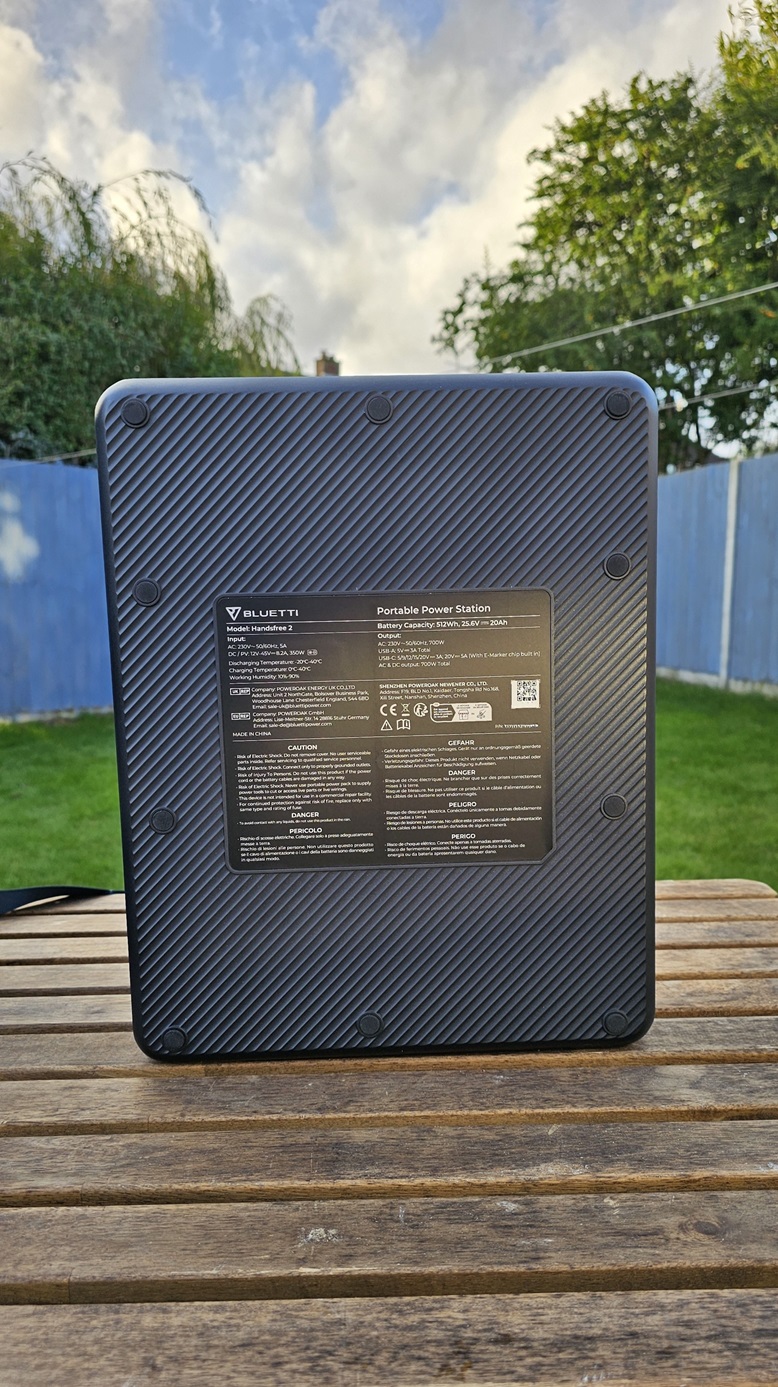
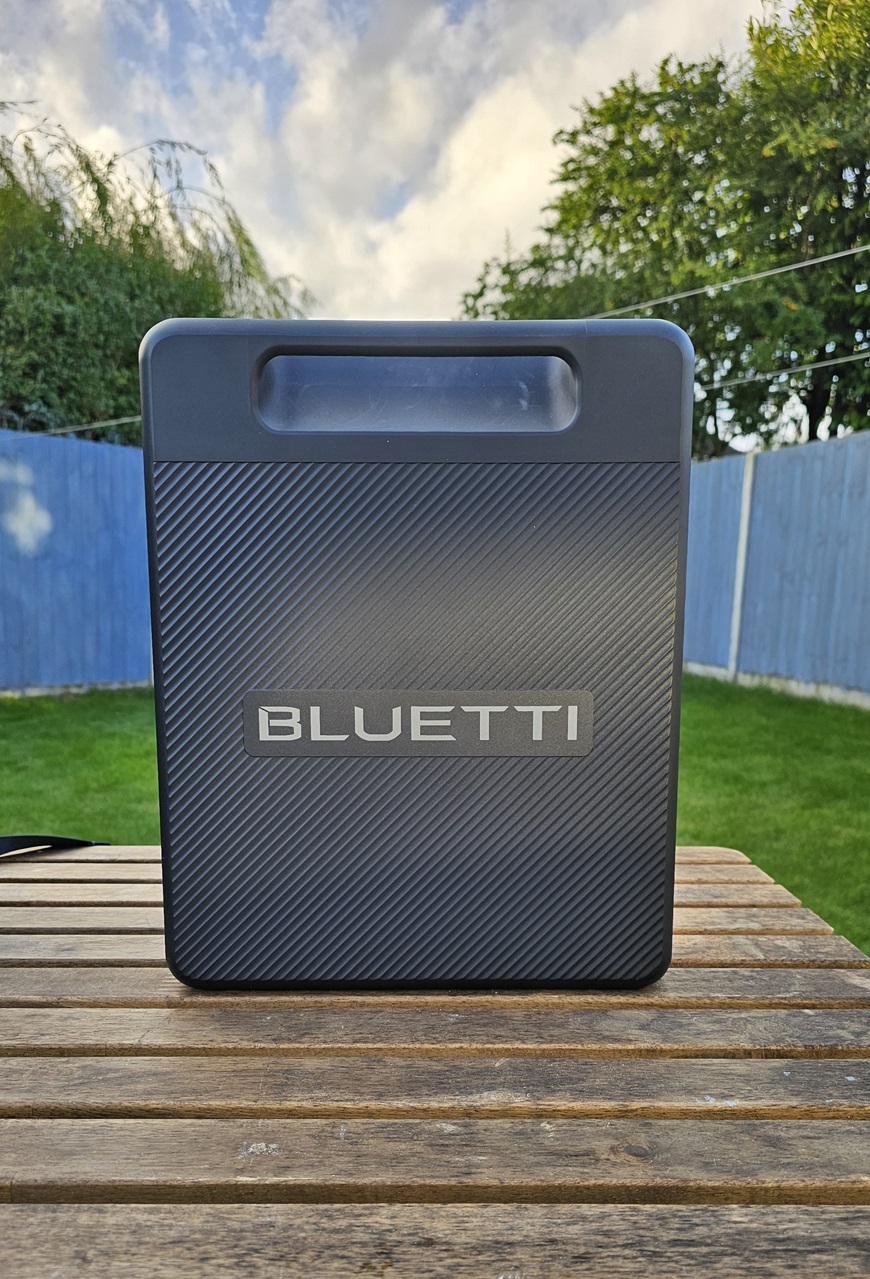
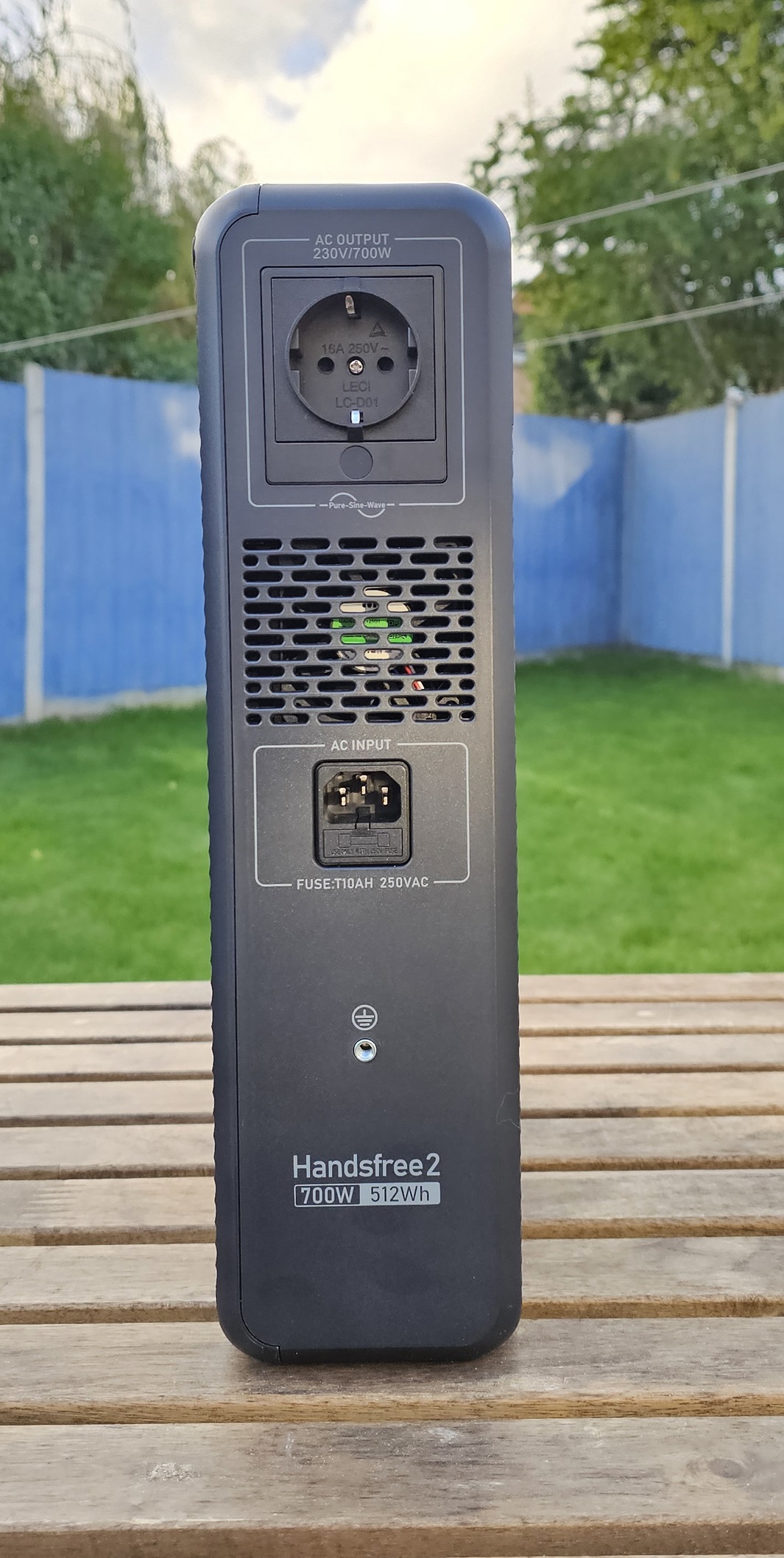
Now on to the ruck sack itself. The bag is made from a very high-quality Polyester fabric/material with padding in several places with some useful built in features.
At the front is the Bluetti logo, at the top is a small zip pouch, below that is a pouch with a hook and loop fastened flap with 6 loops of fabric tape that resembles MOLLE loops but isn’t and at the bottom is a large zip up pouch which contains some internal pockets for ID badges, pens etc. Between the flaps are buckles so that items and things can be looped through them.
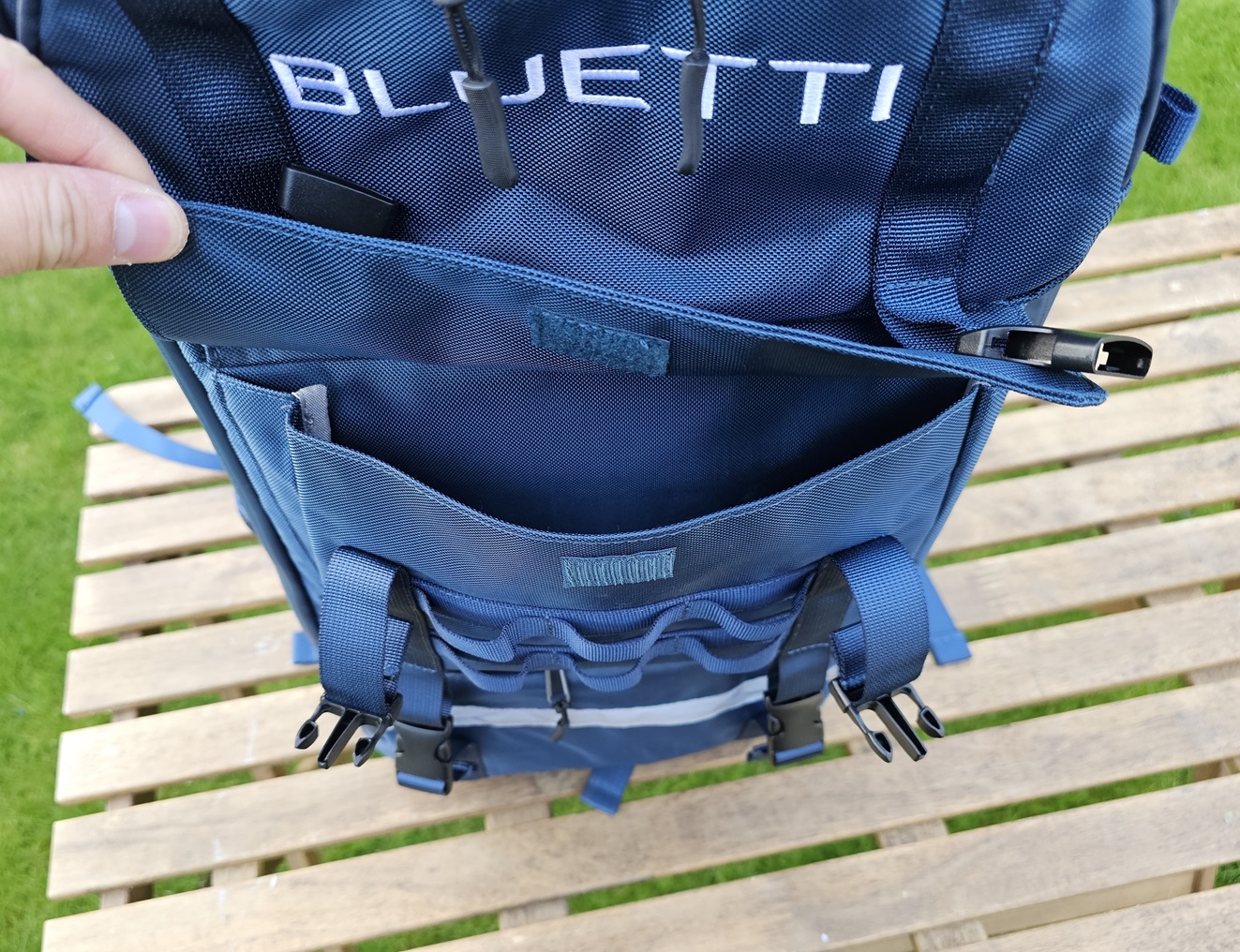
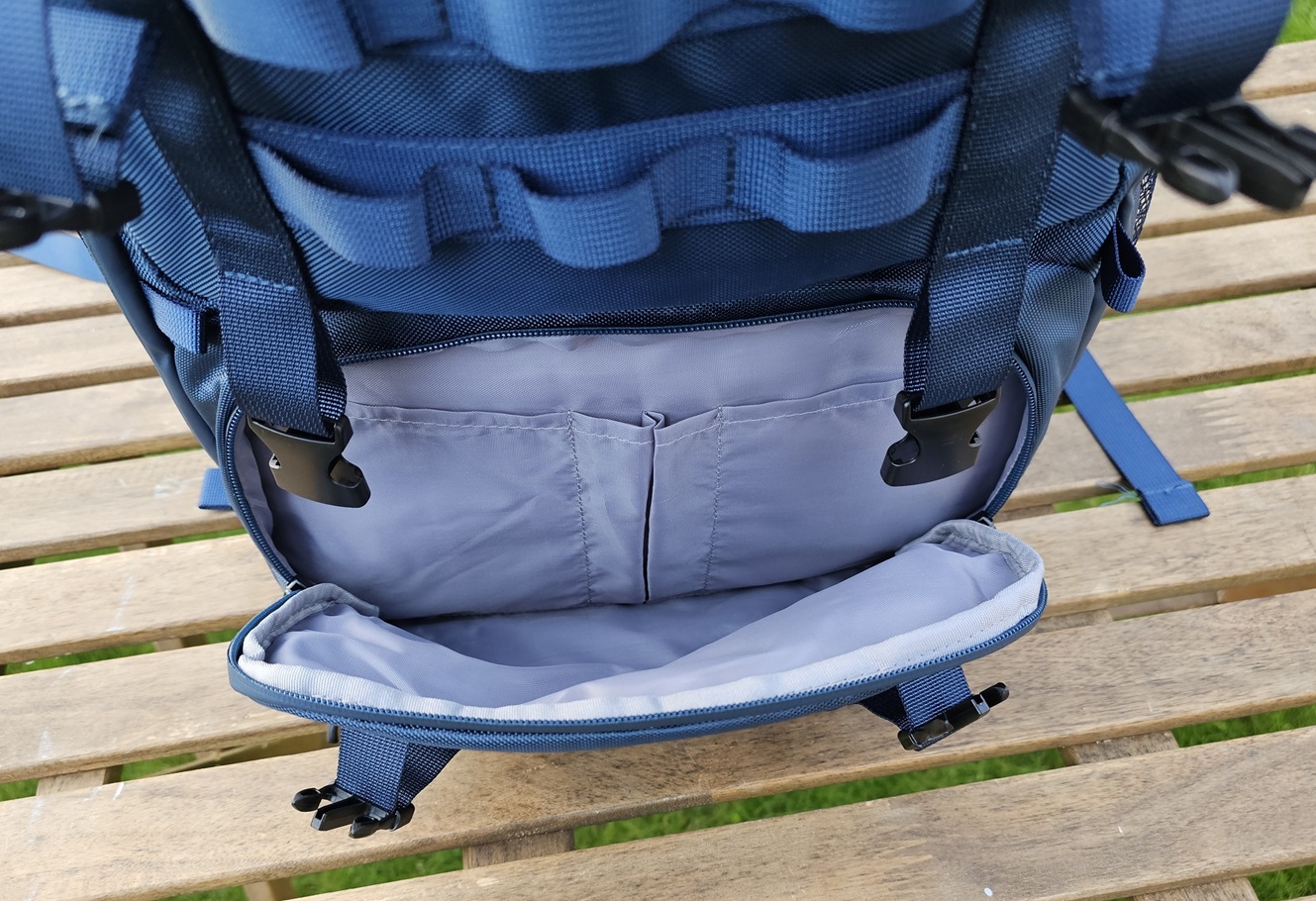
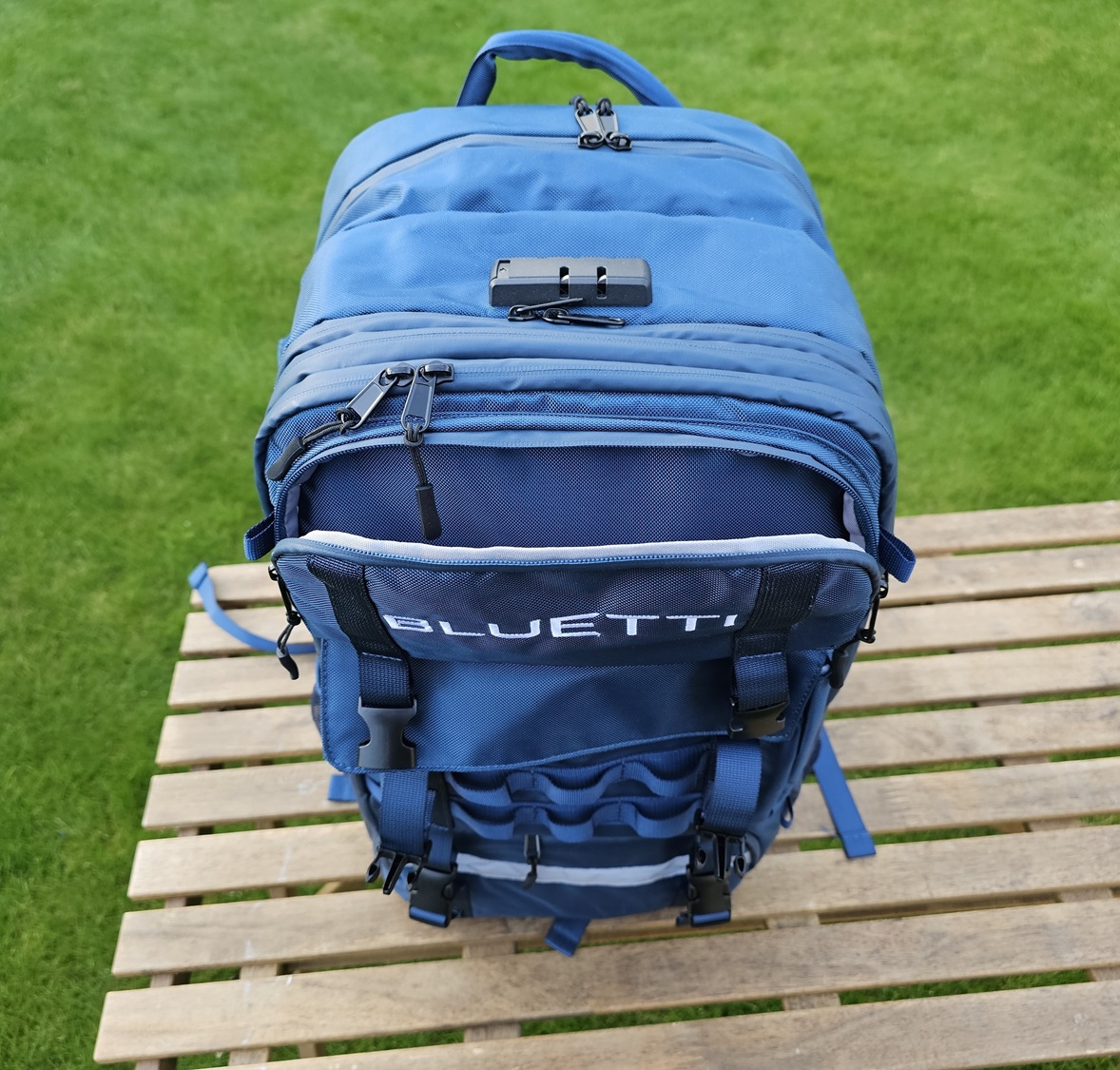
Opening the first part of the bag reveals what I like to call “the personal compartment” of the bag, this has a more typical carryon luggage type of compartment, it has mesh compartments both zipped and not as well as the straps often found in such type of luggage. There is a zip the runs all the way around that allows you to expand the entirety of the compartment so that you may fill it with clothes, toiletries and personal effects.
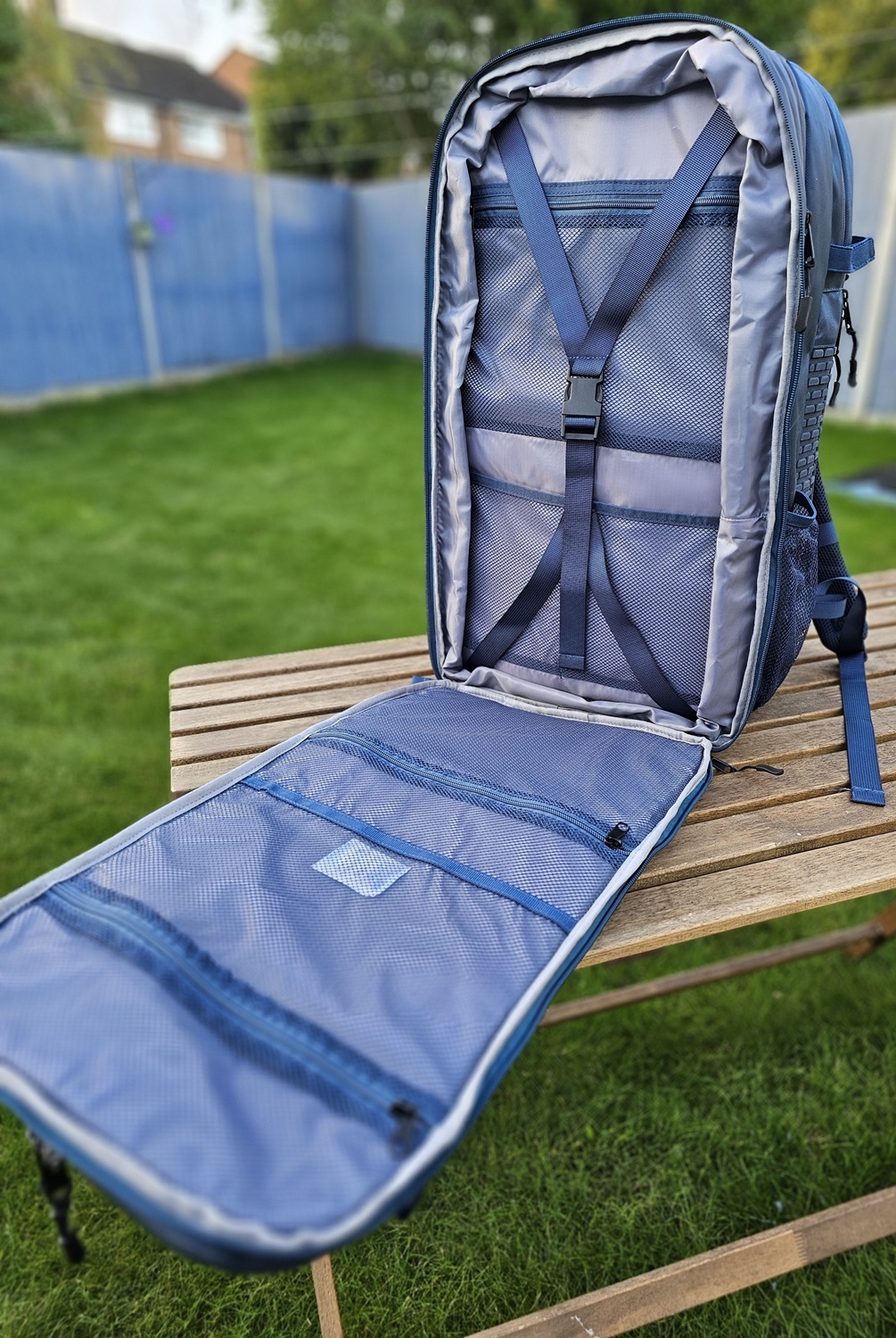
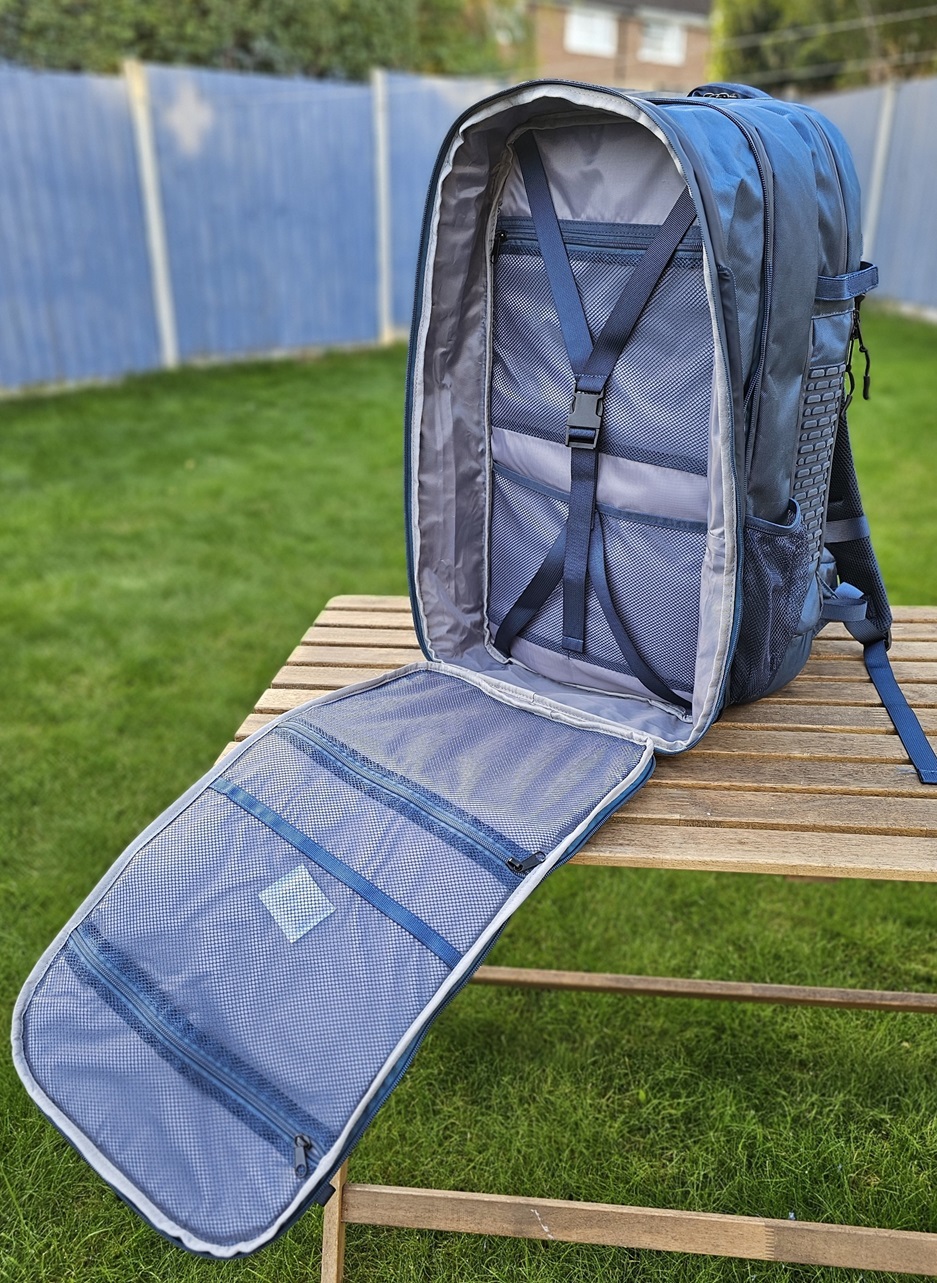
The next compartment I like to call the “equipment compartment”. This has a pouch for a laptop, I was able to easily fit a 13” and 15” laptop, both at the same time. This compartment has various padding dividers allowing you to customise the inside based on what devices you wish to carry such as cameras, drones etc.
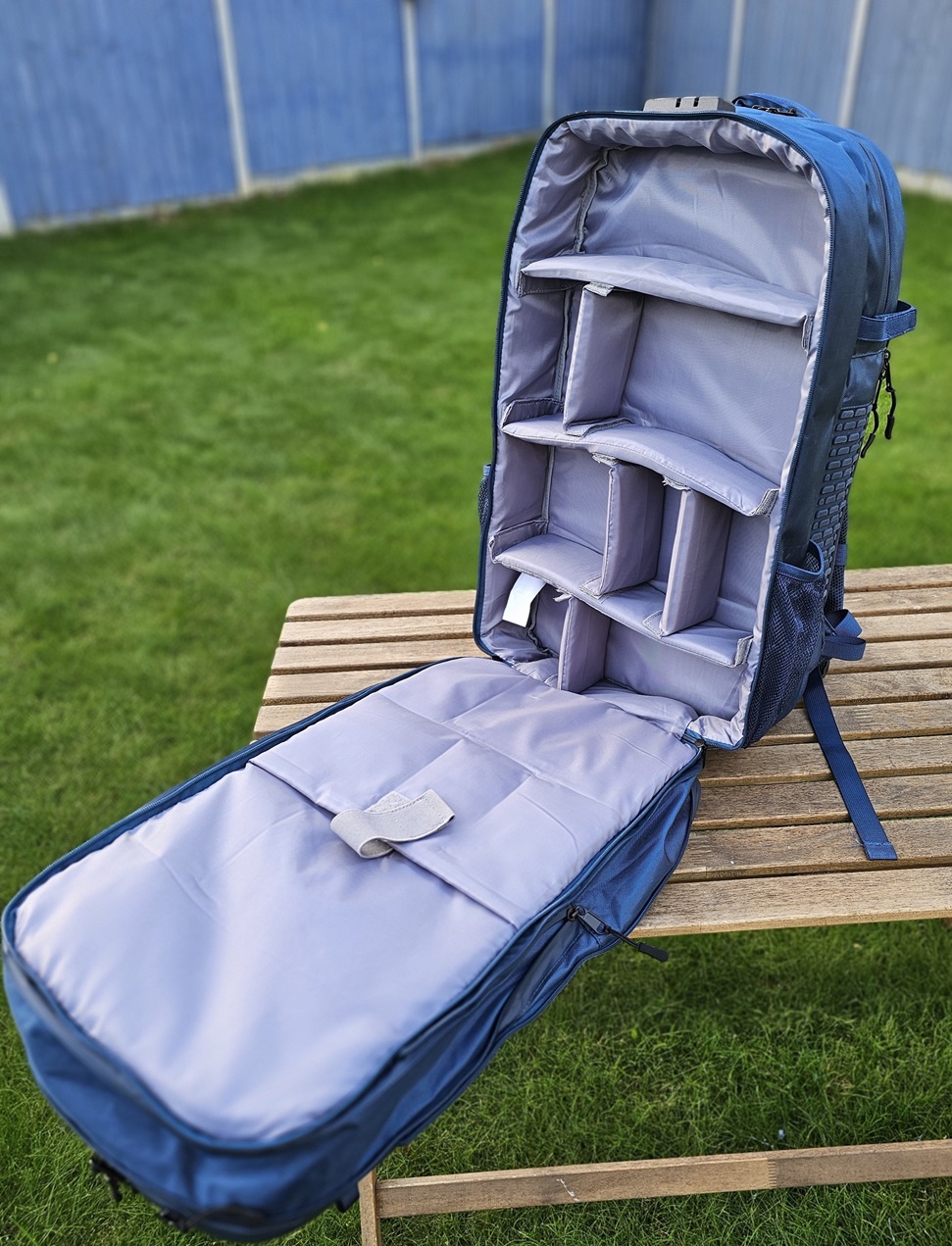
The last compartment and the one closest to your back is the power bank one, the space is a snug compartment for the power bank with hook and loop straps to hold it in and a top divider allowing you use the last 20% of the rear compartment for personal effects. The sides of this compartment have vented rubber like flaps which can be opened to allow access to the front and back of the power bank without having to remove it from the bag itself, inside this is also a nice little leather detail of Bluetti’s logo and a slogan. An odd note was that the covering flap said “only use with Handsfree 1” though this is the Handsfree 2?
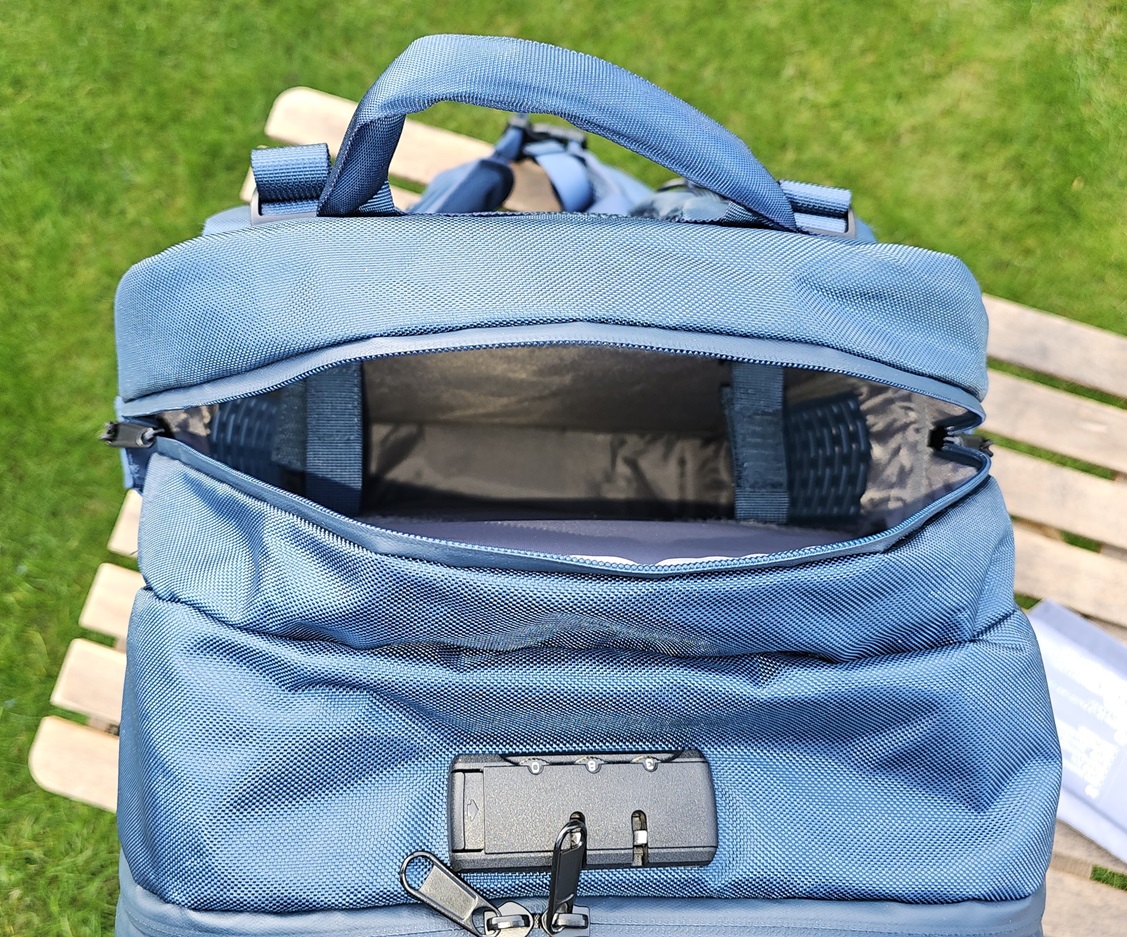
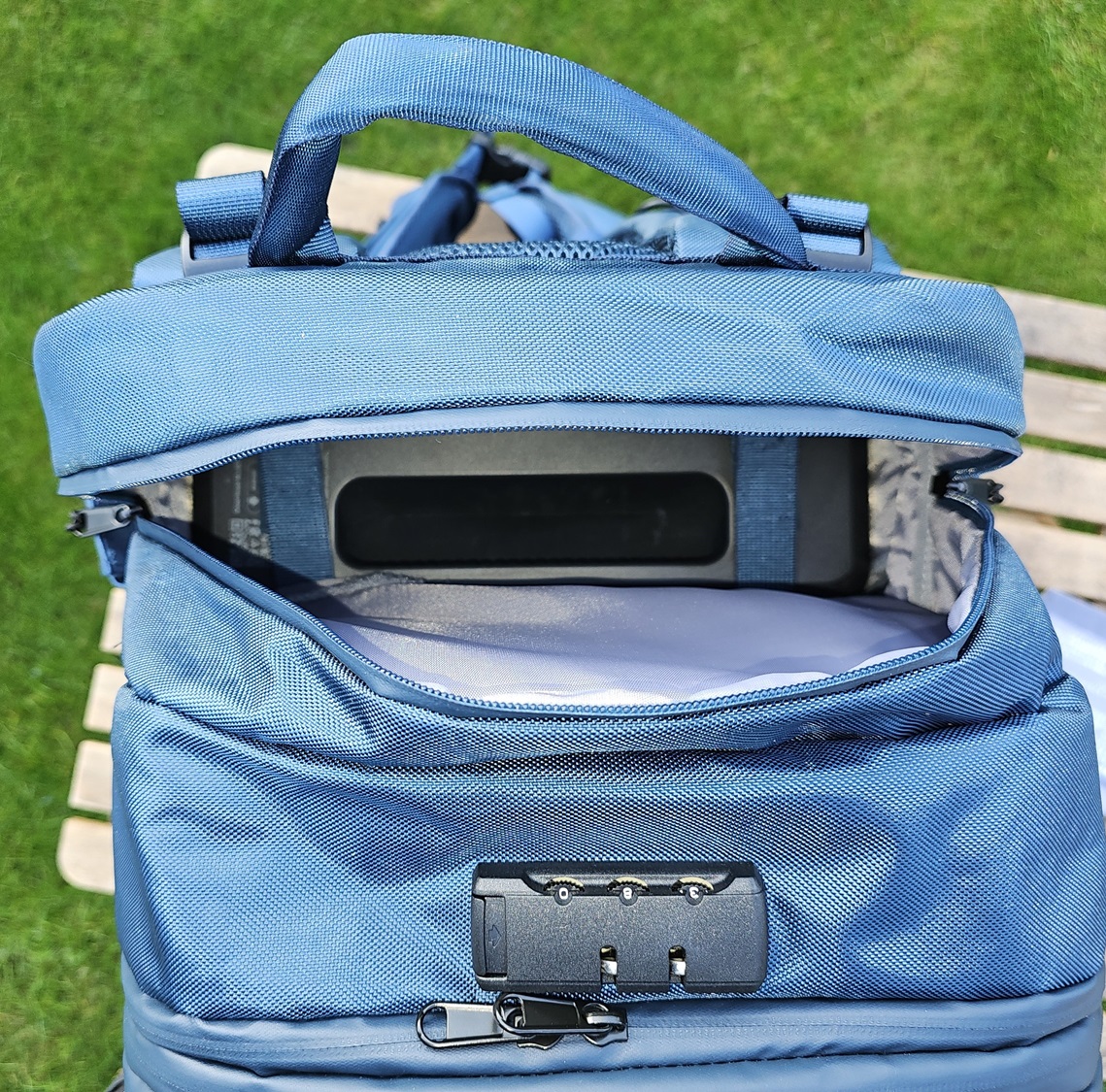
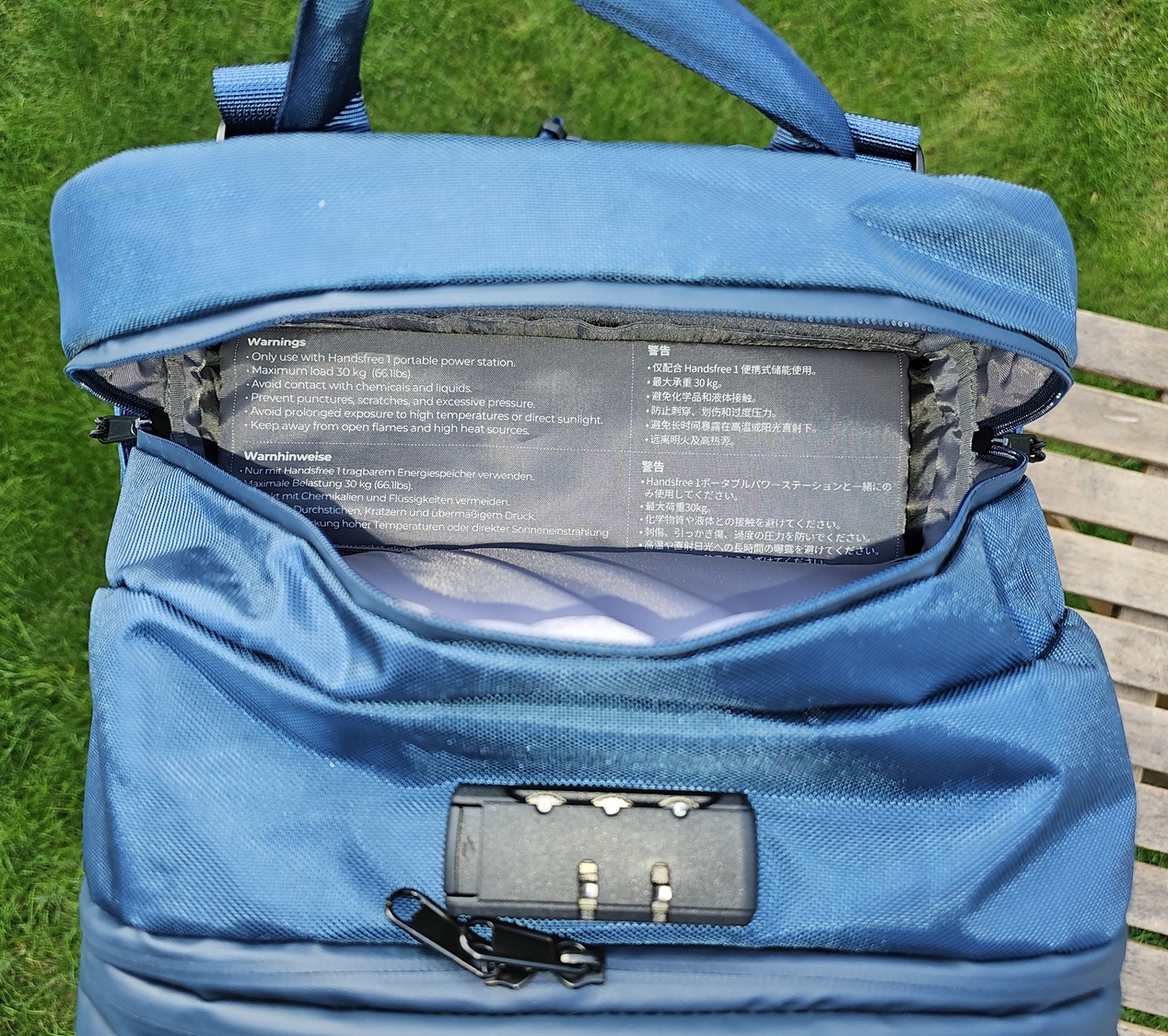
Finally, some other points of the outside of the bag are, at the top is a security 3-digit combination lock for the equipment section, at the bottom are two carrying straps which can be used to cinch items to the bag, I pictured a camping mat. Some smaller loops on the front of the bag for hooking carabiners or as they show in their publication, portable solar panels to charge the power bank. On either side are two straps which can be used to hold the side flaps up and open for access to the power bank. There are two mesh pockets to stash water bottles or small items and towards the top bungee cords for securing longer items and objects.
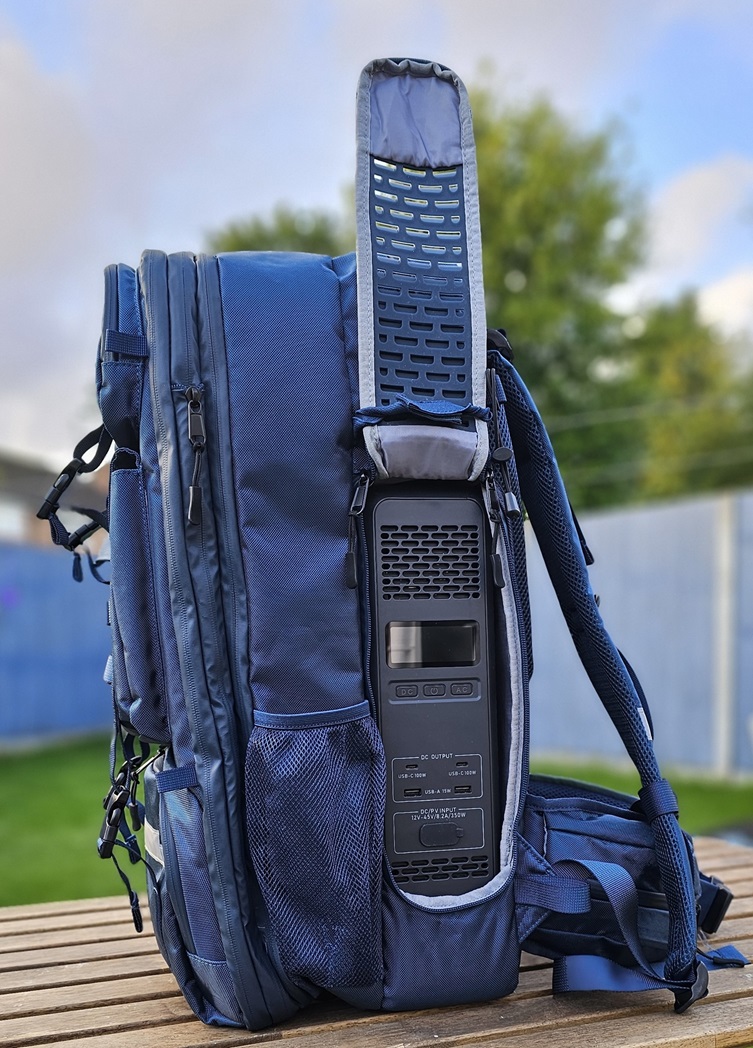
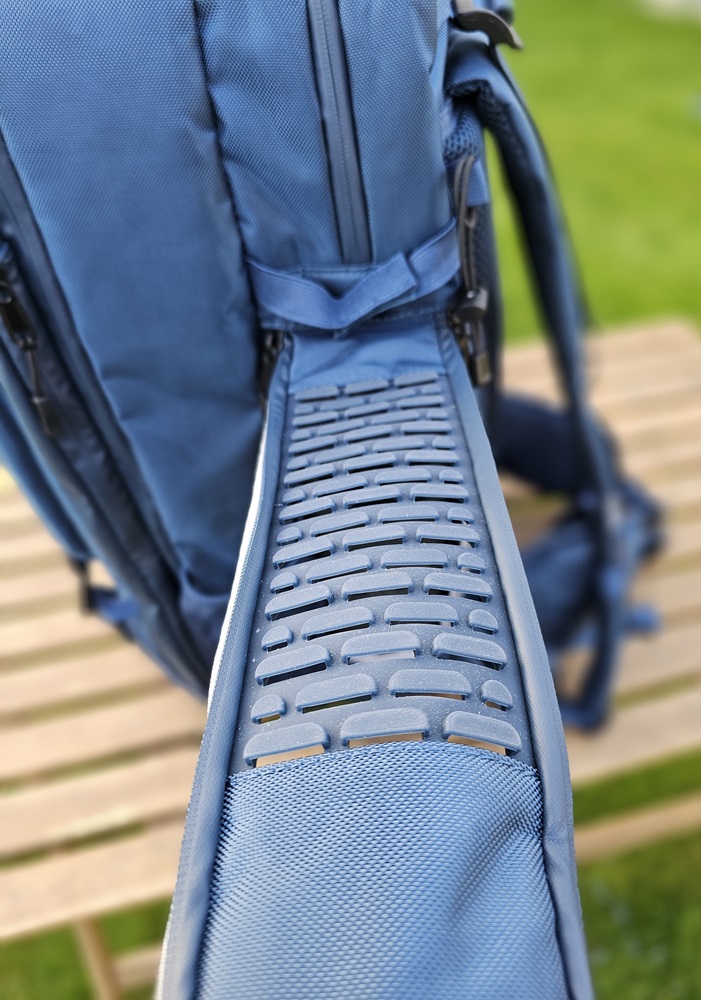
The two shoulder straps are well padded with various adjustment straps above the shoulders and at around the waistline. On the left strap is a non removable GoPro mount just above the chest strap. Then there are the waist straps which have little pouches built into them, I also located the storm cover in the right waist strap pouch. On that note all external zips have a rubber like lining to them to improve water repellency as does the fabric of the bag itself.
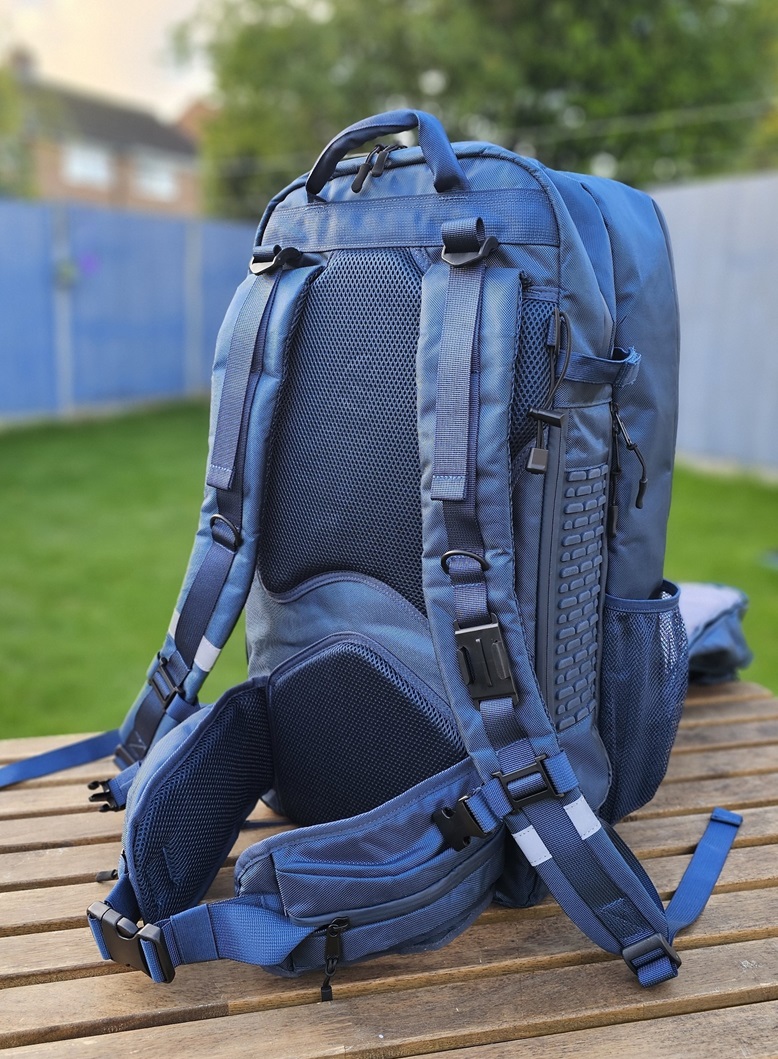
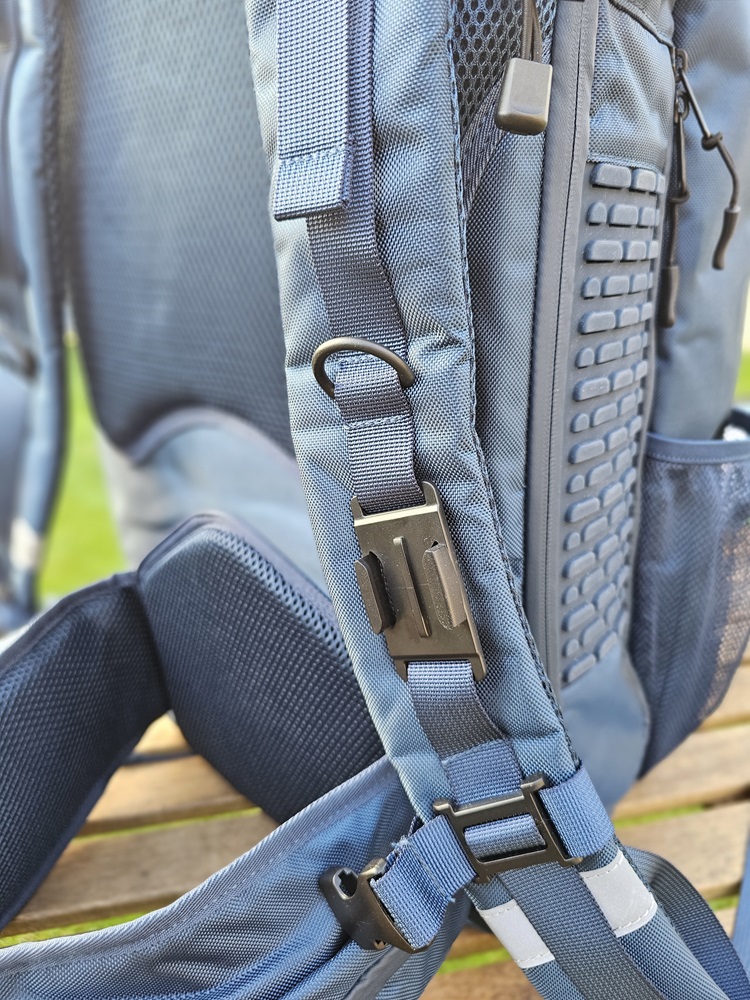
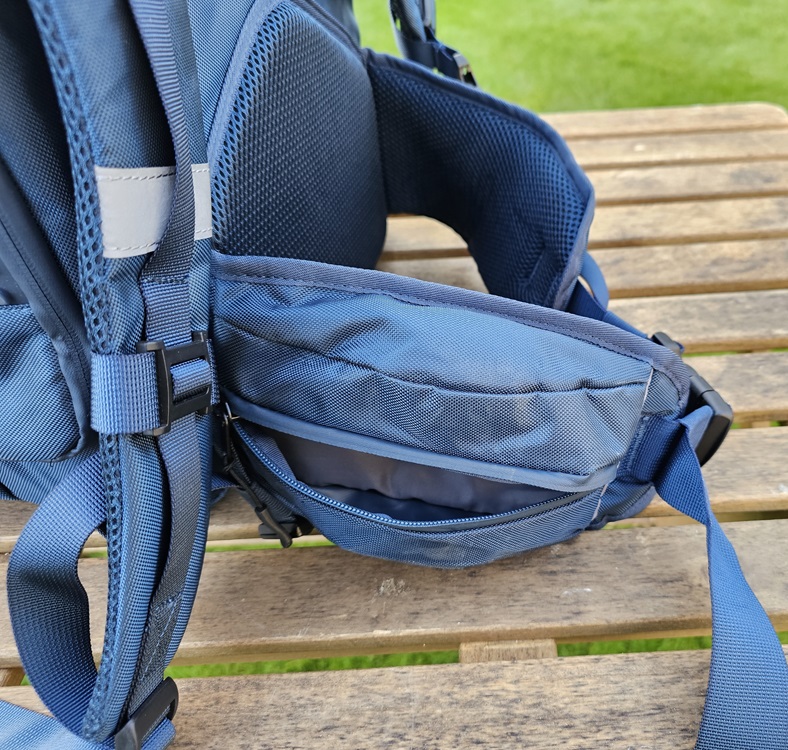
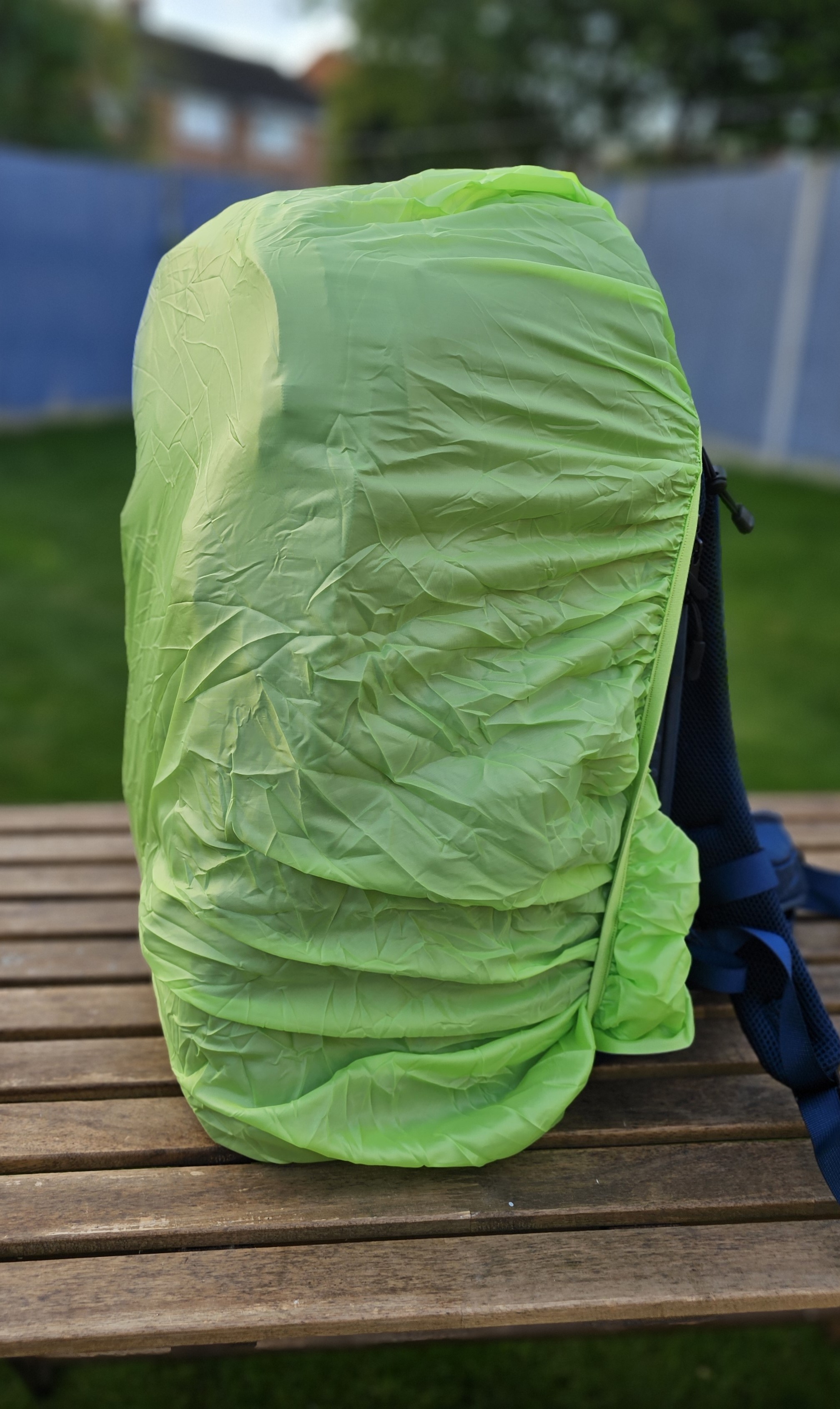
Bluetti Handsfree 2: In use
Using it is as simple as charging up the power bank in your method of choice, slip it into the bag and fill it up with what you need. The first thing that was noticed was the heft of the bag even when empty weighing in at a little over 10Kgs.
Once filled with equipment and clothes at the maximum expansion, it was noted how chunky the bag was protruding from my back, in the image the manual is A5 in size. It is so big and heavy I don’t think it can be classed as carry on luggage at all, battery capacity notwithstanding as most airlines have a maximum lithium battery capacity size of 160Wh.
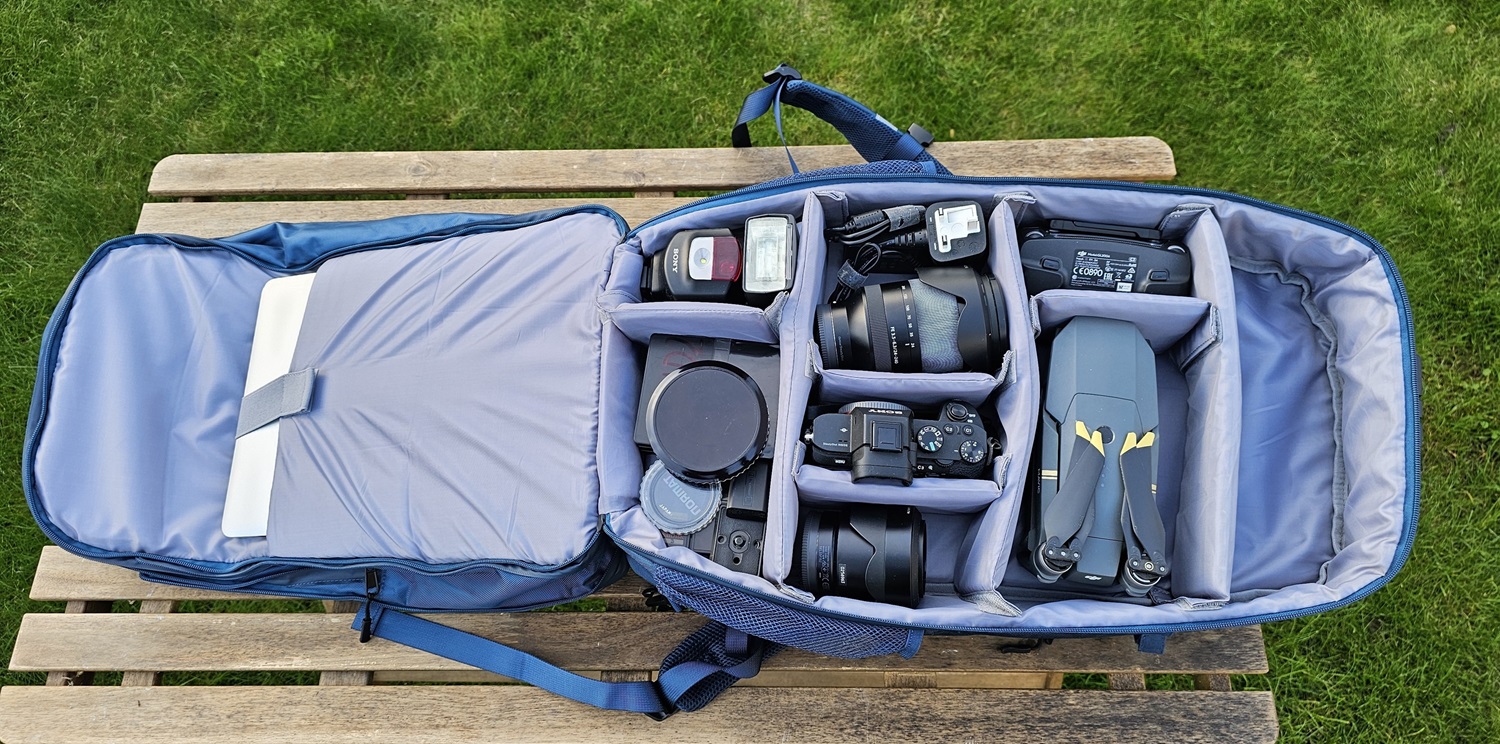
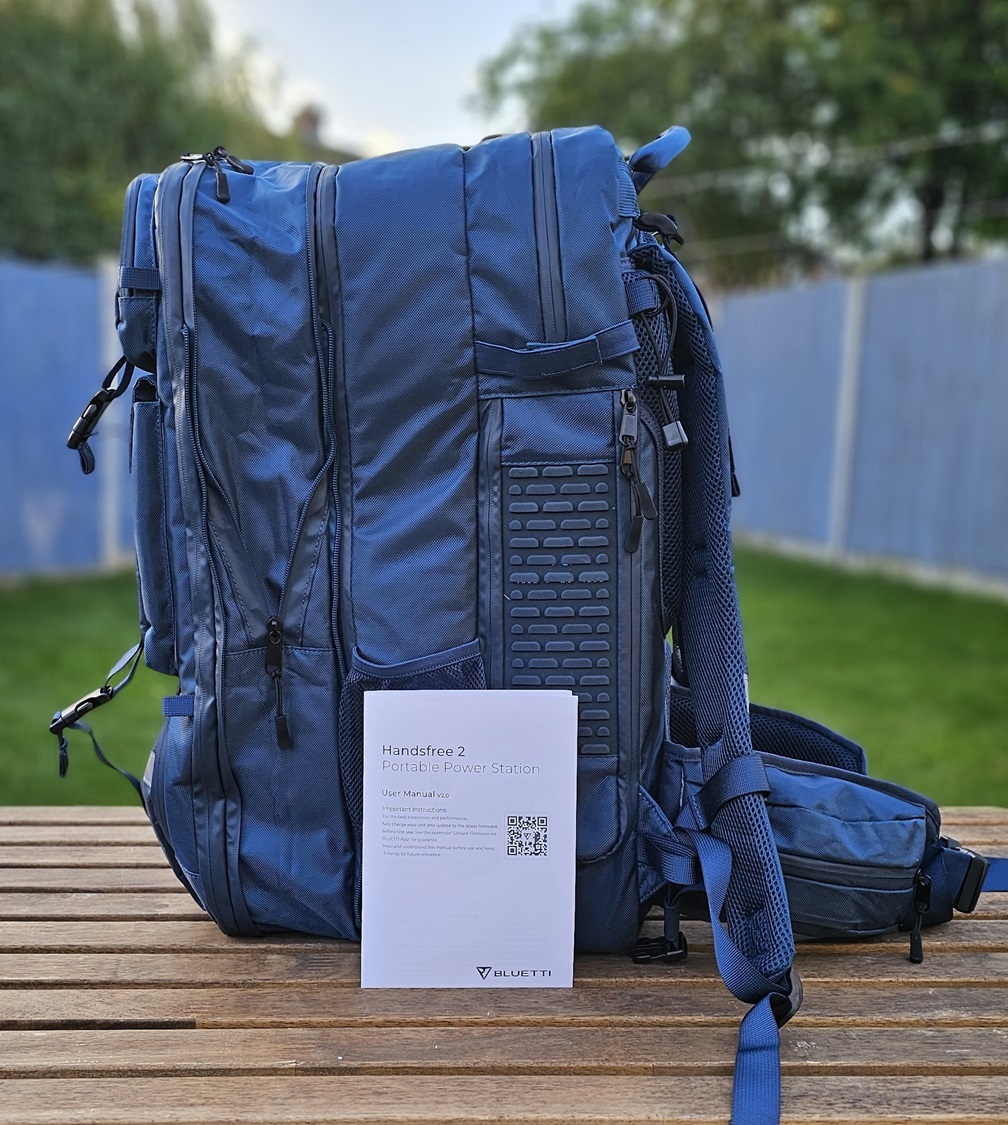
The bag has no internal rigid frame meaning that the body of the bag is made by the battery, not a bad thing as it lightens the weight. One person pointed out that a frame with wheels at the base and a pull handle like those seen on carry-on and larger suitcases would have been a nice touch as carrying it by back or hand would rapidly be tiring.
I handed this to a person who works in emergency services, where remote power was often needed or necessary for on site incidents to have a go at using. Using it for a week, he noted that the external zips on the battery compartment flaps snagged the mesh pockets on the side, which in turn tore the mesh netting leading to a hole (see photo).
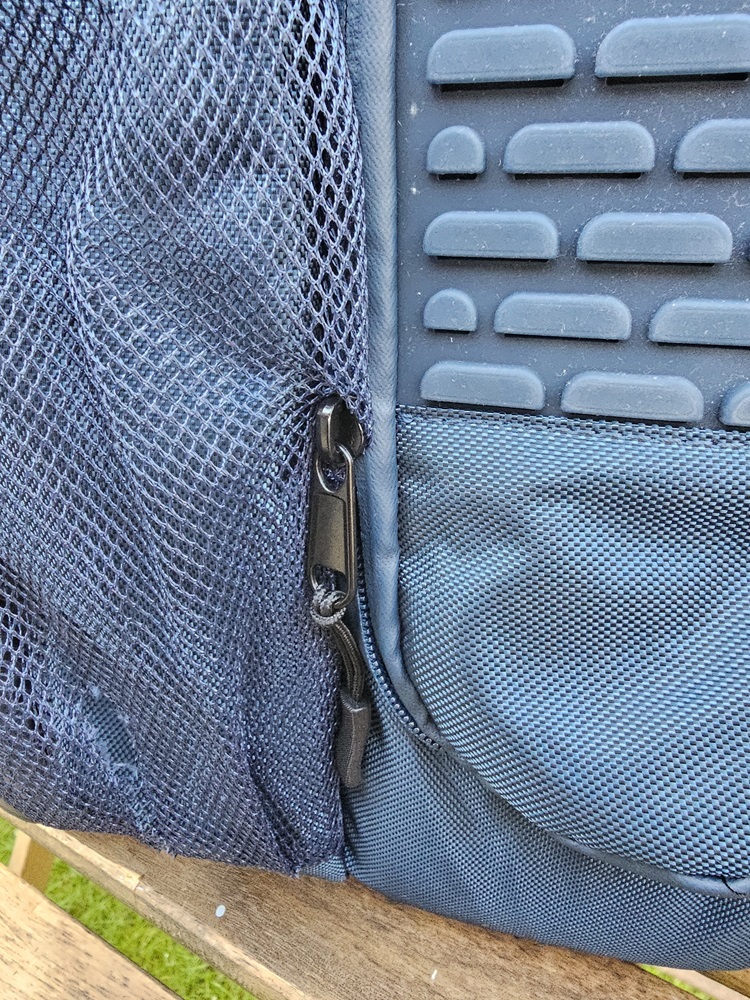
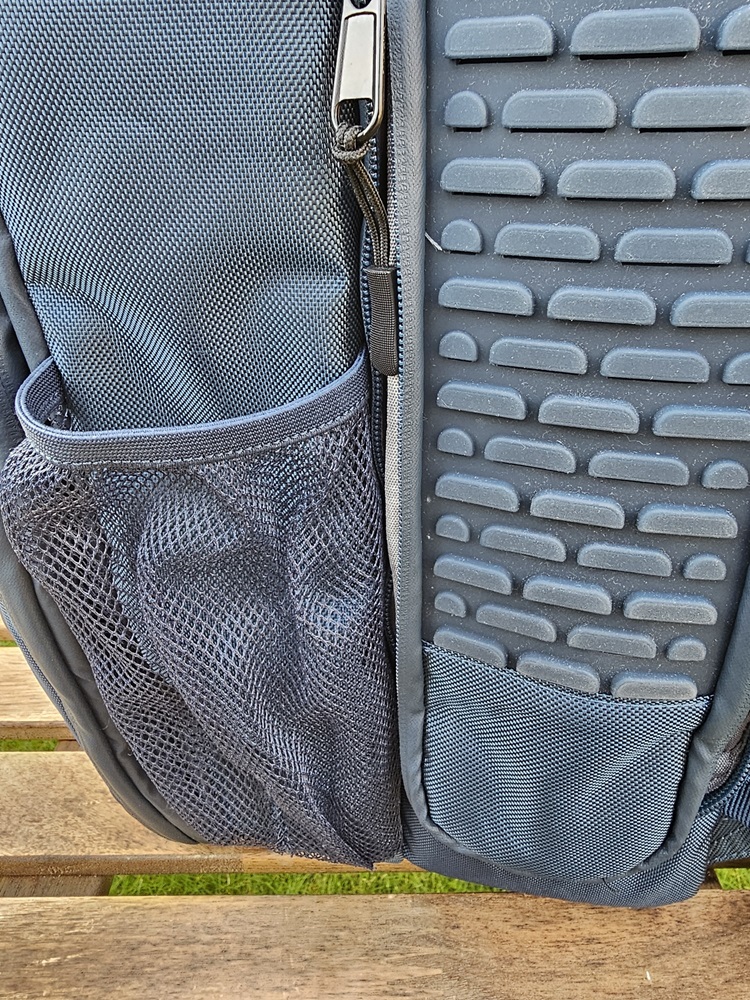
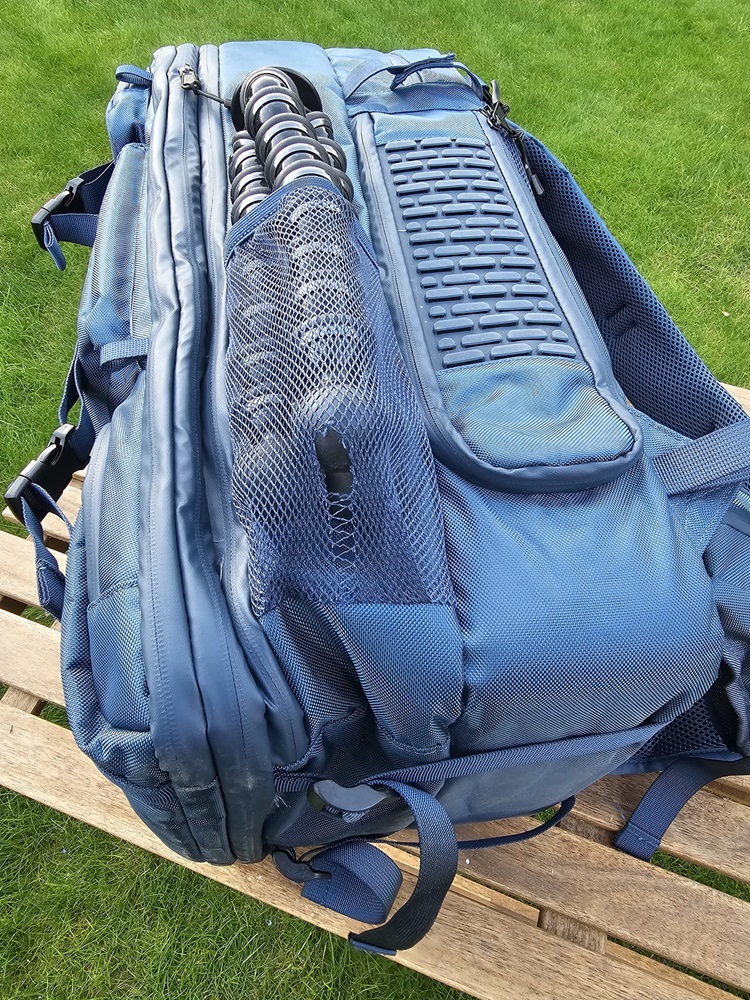
He noted that this was the only design flaw of the bag, he commented on how well built the bag was but that it wasn’t made for emergency services in mind as the compartments shape and size did not suit him. The weight was another factor as he was now carrying around a far bigger battery pack than before, also comments from colleagues about the sheer size of the bag.
So, who is this product made for? My guess, and that of Bluetti’s, is for the drone operator or photographer who needs to carry their equipment, needs an amount of portable power and maybe a change of clothes for an overnight shoot or job at a remote location which requires only walking to for that last mile or two from a larger base camp or vehicle. I cannot see this being used as an every day carry for daily use unless you want a work out.
There is the standard Bluetti App which faultlessly syncs to the battery giving you more control, status and options than the three buttons on the front. The app is well made showing you more detail on charge and discharge stats.
Bluetti Handsfree 2: Price
Currently this product isn’t available in the UK or EU markets, the US shows it retailing with a launch price of $399 but an RRP of $599 (£305 GBP and £460 GBP respectively). No tell of when there will be a UK or EU launch date for this product.
Oddly, you can buy the battery which comes with the bag or the bag itself for $199 USD (£152 GBP) but you can’t buy the battery alone, I would say that there is probably a market for those that want this battery size.
Bluetti Handsfree 2: Final verdict
Overall as a product, it is very well made, the battery power bank is large enough to handle most day to day charging of small electronic devices with ease without seeming to be underpowered when compared to smaller battery banks. If you need more output wattage then the bigger brethren of the Handsfree 2 would be needed such as the AC200L.
The ruck to carry it is very well made for a company who are not specialised in ruck sacks or equipment bags, its quite clear that Bluetti did their research and know that this product is aimed for the tech gear person who travels (but not by air) and needs portable power but not the heavy lifting of larger battery banks.
A great bag for drone operators as it has space for one or two drones, batteries and kit for them. Dare I say a certain country would love this product where they have plenty of field drone operators, the need for portable power in a small, agile product.







